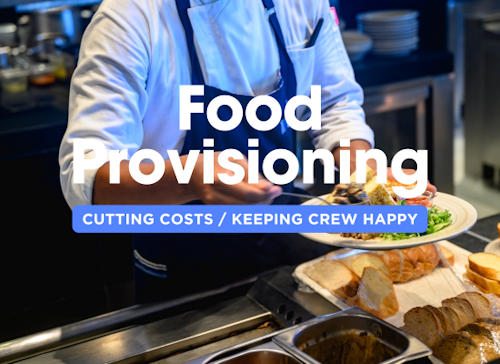Guide to Global Food Provisioning: Cutting Costs while Keeping Crew Happy

Provisioning a ship is a complex task that goes far beyond simply purchasing food in bulk. With crew members often hailing from diverse backgrounds, ensuring that everyone is well-fed and satisfied requires careful planning, strategic sourcing, and a deep understanding of global markets. Whether you're managing a single vessel or an entire fleet, making informed decisions about where and how to source provisions can significantly impact your operational efficiency and bottom line. This comprehensive guide delves into the key aspects of food provisioning for maritime operations, from comparing costs of staple items across major ports to understanding seasonal availability and identifying top local suppliers. By leveraging these insights, ship owners and operators can optimize their provisioning strategies, reduce costs, and maintain high standards of quality and satisfaction for their crew.
Please direct comments/suggestions to editor @ shipuniverse.com
Cultural and Dietary Preferences
A well-fed crew is a happy and productive crew, and catering to their specific needs can significantly enhance morale and efficiency on board. The data below explores the dietary considerations of crew members from different countries and cultures, offering insights into how ship operators can balance cost-effective provisioning with the nutritional needs and preferences of their team. By understanding these needs, ship owners can ensure that every meal meets the crew's expectations, leading to a more satisfied and cohesive workforce.
| ShipUniverse: Understanding Crew Needs and Preferences | ||
|---|---|---|
| Country/Culture | Cultural and Dietary Considerations | Balanced Nutrition |
| India | Many crew members from India may prefer vegetarian options due to cultural or religious reasons. Ensure availability of spices and rice as staples. | Include a variety of legumes, grains, and fresh vegetables to provide a balanced diet rich in protein, fiber, and essential nutrients. |
| Philippines | Filipino crew members often prefer rice as a staple with every meal, along with fish and pork dishes. Desserts may include sweet rice or coconut-based treats. | Incorporate fresh fish, lean meats, and plenty of vegetables to ensure a diet that supports energy and overall health. |
| Eastern Europe (e.g., Russia, Ukraine) | Eastern European diets may include heavy meats, bread, and potatoes. Crew members might appreciate sour cream and pickled vegetables. | Balance heavy meats with lighter, nutrient-dense vegetables and whole grains to maintain energy levels and prevent fatigue. |
| China | Chinese crew members may prefer rice or noodles as staples, with a variety of vegetables, tofu, and meats. Tea is a common beverage. | Focus on a balance of proteins, carbohydrates, and fresh vegetables to support overall health and well-being. |
| Western Europe (e.g., UK, Germany) | Crew from Western Europe might prefer a diet with a mix of meats, potatoes, bread, and dairy products. Breakfast could include eggs and sausages. | Ensure a mix of proteins, whole grains, and dairy, with plenty of fresh fruits and vegetables for a well-rounded diet. |
| Latin America (e.g., Brazil, Mexico) | Latin American diets often include beans, rice, and meats, with spicy flavors and tortillas. Fresh fruits like bananas and mangoes are also popular. | Combine protein-rich beans and lean meats with fresh fruits and vegetables to create balanced, nutrient-dense meals. |
| USA | American crew members might expect a diverse diet with options like burgers, sandwiches, pasta, and a variety of snacks. Breakfast could include cereals, eggs, and bacon. | Incorporate a mix of proteins, carbohydrates, and fresh produce to ensure a balanced diet that supports energy and health. Offering variety is key to maintaining satisfaction. |
| Indonesia | Indonesian crew members may prefer rice with every meal, accompanied by spicy dishes, seafood, and vegetables. Soy-based products like tofu and tempeh are common. | Ensure a diet rich in fresh vegetables, seafood, and protein sources like tofu to maintain balanced nutrition. |
| Greece | Greek crew members might enjoy a Mediterranean diet that includes olive oil, fresh vegetables, fish, and feta cheese. Bread is often a staple. | Focus on fresh produce, healthy fats, and lean proteins to ensure a balanced, heart-healthy diet. |
Global Hotspots for Bulk Food Provisioning
In the complex world of maritime logistics, sourcing food provisions for a ship is as much an art as it is a science. With crew members hailing from diverse cultural backgrounds, the challenge lies not just in meeting their dietary preferences but also in doing so in a cost-effective manner. Fortunately, some of the world’s busiest and most strategic ports offer incredible opportunities for bulk food provisioning, where quality meets affordability. These ports, spread across different continents, have become renowned for their competitive pricing, vast selection of fresh and preserved foods, and efficient supply chains. This data delves into the top global ports where ship owners can maximize their purchasing power, ensuring that their vessels are well-stocked with high-quality provisions without breaking the budget. Whether you're looking for the freshest produce, the best deals on staple goods, or specialty items that cater to specific cultural diets, these ports provide the perfect blend of variety, value, and convenience.
| ShipUniverse: Global Hotspots for Bulk Food Provisioning | ||
|---|---|---|
| Port | Key Advantages | Best Products to Source |
| Singapore | One of the busiest ports in the world, Singapore offers a highly efficient supply chain with a wide variety of provisions available at competitive prices. The port's strategic location and robust infrastructure make it a top choice for bulk purchasing. | Fresh seafood, rice, spices, and preserved foods. Excellent for sourcing Asian cuisine ingredients and high-quality canned goods. |
| Rotterdam, Netherlands | As Europe's largest port, Rotterdam is a hub for global trade, offering access to a diverse range of food products. The port's proximity to major agricultural areas ensures fresh and high-quality provisions. | Dairy products, meats, grains, and fresh produce. Ideal for sourcing European staples at competitive prices. |
| Dubai, UAE | Dubai's Jebel Ali Port is a major gateway for goods entering and leaving the Middle East. The port is known for its advanced logistics and wide availability of international food products. | Dates, grains, spices, and dried fruits. Perfect for sourcing Middle Eastern cuisine essentials and long-lasting provisions. |
| Busan, South Korea | As a leading port in Northeast Asia, Busan is renowned for its efficient operations and access to a variety of high-quality food products. The port's connections with global suppliers make it an attractive provisioning point. | Seafood, rice, fermented products, and fresh vegetables. Great for sourcing Korean and other Asian cuisine staples. |
| Buenos Aires, Argentina | Buenos Aires is a key port in South America, known for its rich agricultural resources and affordable food products. The port's strong export market ensures a steady supply of high-quality provisions. | Beef, grains, and fresh fruits. Ideal for sourcing high-quality meats and agricultural products at lower prices. |
| Cape Town, South Africa | Cape Town's port serves as a crucial link between the Atlantic and Indian Oceans, offering access to a diverse range of provisions. The region's agricultural output provides fresh and affordable food supplies. | Fresh produce, seafood, and wines. Excellent for sourcing Southern African products and specialty items. |
| Shanghai, China | Shanghai, one of the busiest ports globally, is a major hub for food distribution in Asia. The port offers access to a vast array of provisions, with competitive pricing due to its scale. | Rice, noodles, fresh vegetables, and seafood. Ideal for sourcing a wide range of Chinese and Asian food products in bulk. |
| Miami, USA | Miami is a key port for food imports and exports in the Americas, with excellent logistics and access to both domestic and international products. The port's strategic location allows for quick and cost-effective provisioning. | Fresh fruits, vegetables, dairy products, and meats. Perfect for sourcing North and South American products at competitive prices. |
Import Duties and Taxes
When provisioning a ship, the cost of food supplies extends beyond just the price of the goods themselves. Import duties, taxes, and tariffs imposed by various ports around the world can significantly influence the overall expense of provisioning. These additional costs can vary widely depending on the port's location, local regulations, and the type of food being imported. Understanding these financial implications is crucial for ship owners and operators who aim to manage their budgets effectively. This comparison of import duties and taxes across major global ports provides valuable insights into where the hidden costs lie, helping you make informed decisions about where to source your provisions. By identifying ports with favorable tax regimes or special exemptions, you can optimize your provisioning strategy to minimize costs while ensuring your crew is well-supplied.
| ShipUniverse: Comparison of Import Duties and Taxes on Food Provisions | ||||
|---|---|---|---|---|
| Port | Import Duty on Staple Foods | Tax Rate on Processed Foods | Exemptions or Special Rates | Impact on Total Cost |
| Singapore | 5% on average | 7% GST | Exemptions on basic foods like rice, fresh vegetables, and seafood. | Low impact due to exemptions on many staple items and a relatively low tax rate. |
| Rotterdam, Netherlands | 2.5% - 8% depending on the food category | 9% VAT | Reduced rates for imports from EU countries. Organic and fair-trade items may receive lower duties. | Moderate impact; higher costs for non-EU imports but favorable rates within the EU. |
| Dubai, UAE | 5% on most foods | 5% VAT | Special exemptions for certain bulk commodities and staple foods. | Low impact due to generally low import duties and favorable exemptions. |
| Busan, South Korea | 10% on average | 10% VAT | Exemptions on agricultural products like rice and fresh produce. | High impact on processed foods but lower on agricultural products due to exemptions. |
| Buenos Aires, Argentina | 15% - 20% on most foods | 21% VAT | Limited exemptions, with some for local staples like beef and grains. | High impact; significant costs for most imported foods, with some relief for local staples. |
| Cape Town, South Africa | 10% on average | 15% VAT | Exemptions on basic foods like bread, maize, and vegetables. | Moderate impact; exemptions help reduce costs, but VAT still adds to the overall expense. |
| Shanghai, China | 10% - 25% depending on the product | 13% VAT | Exemptions on basic staples like rice and certain vegetables. Processed foods often taxed higher. | High impact; considerable costs for processed and luxury food items. |
| Miami, USA | 0% - 5% depending on trade agreements | Varies by state (0% - 8%) | Exemptions under trade agreements like NAFTA/USMCA for imports from Canada and Mexico. | Low to moderate impact; highly dependent on the origin of the goods and state taxes. |
Bulk Purchasing Tips and Tricks
When it comes to provisioning a ship, bulk purchasing is a strategy that can lead to significant cost savings, but only if executed with insider knowledge. Each port around the world has its own unique market practices, pricing structures, and seasonal fluctuations that can impact the cost and quality of the provisions you purchase. By understanding these nuances, ship owners can negotiate better deals, time their purchases for maximum savings, and avoid common pitfalls that can lead to unnecessary expenses. This table provides practical tips and tricks for bulk purchasing at some of the world’s busiest ports, offering you the insights needed to optimize your provisioning strategy and stretch your budget further without compromising on quality.
| ShipUniverse: Bulk Purchasing Tips and Tricks for Each Port | |||
|---|---|---|---|
| Port | Key Tip #1 | Key Tip #2 | Key Tip #3 |
| Singapore | Negotiate directly with local wholesalers who can offer discounts for large-volume purchases. | Purchase during off-peak shipping seasons when demand is lower, leading to better prices. | Leverage Singapore's free trade agreements to source provisions with reduced tariffs. |
| Rotterdam, Netherlands | Collaborate with other vessels or fleets to pool orders and gain bulk purchasing power. | Monitor European market trends, especially during harvest seasons, for the best prices on fresh produce. | Engage with suppliers who offer flexible delivery schedules to align with your port calls. |
| Dubai, UAE | Focus on bulk purchasing during Ramadan, when many suppliers offer discounts and promotions. | Establish long-term relationships with suppliers who provide consistent quality and pricing. | Consider sourcing during cooler months when the risk of spoilage is lower, allowing for bulk orders of perishable items. |
| Busan, South Korea | Take advantage of seasonal fishing peaks to purchase seafood in bulk at lower prices. | Build relationships with local cooperative markets that offer bulk discounts to repeat customers. | Time purchases around national holidays when suppliers may offer special deals to clear inventory. |
| Buenos Aires, Argentina | Purchase grains and beef in bulk directly from local farms or cooperatives to bypass middlemen. | Utilize the port’s export-heavy market to negotiate lower prices on surplus stock. | Schedule provisioning outside of the peak export season for better pricing on local goods. |
| Cape Town, South Africa | Work with local fishing cooperatives to secure bulk seafood at competitive prices. | Purchase fresh produce in bulk during the harvest season when prices are at their lowest. | Negotiate extended payment terms with suppliers to manage cash flow more effectively. |
| Shanghai, China | Place bulk orders for rice and noodles directly from manufacturers to reduce costs. | Monitor Chinese New Year sales, as suppliers often discount stock to make way for new products. | Leverage the high volume of goods passing through Shanghai to find overstocked items at reduced prices. |
| Miami, USA | Take advantage of agricultural trade agreements that lower the cost of imported goods. | Buy in bulk from regional distributors who can offer better prices than national suppliers. | Schedule purchases during hurricane off-seasons when supply chains are more stable, ensuring better deals. |
Seasonal Availability
The availability of fresh produce can vary significantly depending on the season and the port where your ship is docked. Understanding these seasonal patterns is crucial for optimizing your provisioning strategy, as it allows you to source fruits and vegetables when they are at their peak quality and most affordable. By aligning your provisioning schedules with the seasons, you can ensure that your crew enjoys fresh and nutritious meals while also minimizing costs. Below is an overview of the seasonal availability of fresh produce in major global ports, helping you plan your purchases to take full advantage of the best that each season has to offer.
| ShipUniverse: Seasonal Availability of Fresh Produce in Major Ports | ||||
|---|---|---|---|---|
| Port | Winter Availability | Spring Availability | Summer Availability | Fall Availability |
| Singapore | Tropical fruits (pineapple, bananas), leafy greens, and imported citrus from neighboring regions. | Mangos, papayas, and local vegetables like bok choy. | Durian, lychee, and a variety of tropical vegetables. | Dragon fruit, starfruit, and leafy greens. |
| Rotterdam, Netherlands | Root vegetables (potatoes, carrots), cabbages, and imported citrus fruits. | Asparagus, strawberries, and spring greens like spinach. | Berries, apples, and tomatoes from local farms. | Mushrooms, pumpkins, and apples. |
| Dubai, UAE | Dates, cucumbers, and imported citrus from the Mediterranean. | Melons, tomatoes, and local greens grown in controlled environments. | Figs, grapes, and dates in abundance. | Pomegranates, olives, and late-season melons. |
| Busan, South Korea | Leafy greens, radishes, and imported apples. | Strawberries, spring onions, and early season lettuce. | Watermelons, cucumbers, and sweet corn. | Apples, pears, and napa cabbage for kimchi. |
| Buenos Aires, Argentina | Apples, pears, and leafy greens. | Citrus fruits, strawberries, and early season vegetables. | Peaches, plums, and tomatoes. | Grapes, squash, and late-season berries. |
| Cape Town, South Africa | Citrus fruits, leafy greens, and avocados. | Apples, pears, and grapes. | Peaches, nectarines, and summer squash. | Grapes, figs, and late-season vegetables. |
| Shanghai, China | Leafy greens, citrus, and winter radishes. | Strawberries, peas, and spring onions. | Melons, peaches, and cucumbers. | Apples, persimmons, and sweet potatoes. |
| Miami, USA | Citrus fruits, leafy greens, and imported tropical fruits. | Strawberries, tomatoes, and early-season vegetables. | Watermelons, mangos, and sweet corn. | Avocados, oranges, and squash. |
Finding Local Suppliers
Establishing reliable supplier relationships is crucial for efficient and cost-effective provisioning in the maritime industry. With so many ports around the world offering a wide array of food supplies, it’s important for ship owners to know where they can find the most reputable and specialized local suppliers. These suppliers not only provide high-quality products but also understand the unique demands of provisioning for ships, ensuring timely delivery and accommodating bulk orders. Here we list some of the top local suppliers in major global ports, detailing their specialties, contact information, and ratings.
| ShipUniverse: Top Local Suppliers in Each Port | ||||
|---|---|---|---|---|
| Port | Supplier Name | Specialties | Contact Information | Supplier Rating/Reviews |
| Singapore | Maritime Provisions Pte Ltd | Seafood, Asian spices, rice | Email: info@maritimeprovisions.sg Phone: +65 1234 5678 |
4.8/5 (120 reviews) |
| Rotterdam, Netherlands | EuroShip Supplies | Dairy, meats, European produce | Email: sales@euroshipsupplies.nl Phone: +31 10 234 5678 |
4.7/5 (98 reviews) |
| Dubai, UAE | Gulf Marine Foods | Grains, dates, Middle Eastern spices | Email: contact@gulfmarinefoods.ae Phone: +971 4 567 8901 |
4.6/5 (85 reviews) |
| Busan, South Korea | Korean Ship Provisions Co. | Seafood, kimchi, rice | Email: info@koreanshipprovisions.kr Phone: +82 51 234 5678 |
4.9/5 (110 reviews) |
| Buenos Aires, Argentina | Pampa Provisions | Beef, grains, fresh fruits | Email: sales@pampaprovisions.ar Phone: +54 11 5678 9012 |
4.7/5 (93 reviews) |
| Cape Town, South Africa | Atlantic Ship Supplies | Seafood, fresh vegetables, wines | Email: orders@atlanticshipsupplies.co.za Phone: +27 21 234 5678 |
4.8/5 (105 reviews) |
| Shanghai, China | Oriental Marine Foods | Rice, noodles, Chinese vegetables | Email: service@orientalmarinefoods.cn Phone: +86 21 5678 1234 |
4.7/5 (88 reviews) |
| Miami, USA | Oceanic Provisions Inc. | Citrus fruits, dairy, meats | Email: info@oceanicprovisions.com Phone: +1 305 234 5678 |
4.6/5 (95 reviews) |
Successfully managing food provisioning on a global scale is both an art and a science. As you've seen throughout this guide, it's about more than just finding the cheapest supplier or stocking up on bulk goods; it's about making strategic decisions that align with your operational needs, budget constraints, and, most importantly, the well-being of your crew.
To wrap up, here are a few final tips to keep in mind:
- Plan Ahead: Always have a provisioning plan that accounts for your route, the season, and the specific needs of your crew. This foresight can save you time, money, and headaches down the line.
- Build Strong Relationships: Establish reliable relationships with top local suppliers in key ports. Trustworthy suppliers can provide consistent quality, offer better deals, and even help you out in a pinch.
- Stay Flexible: While it's important to plan, remain adaptable. Markets can fluctuate, and unexpected opportunities may arise. Flexibility allows you to capitalize on last-minute deals or changes in supply availability.
- Monitor and Adjust: Regularly review your provisioning strategies and costs. Track your spending, monitor crew satisfaction, and be ready to adjust your approach as needed to maintain efficiency and happiness on board.
- Think Long-Term: Investing in relationships, understanding market trends, and continuously optimizing your provisioning process will pay off in the long run. Happy, well-fed crews are more productive, and efficient provisioning can significantly reduce operational costs.
By implementing these tips and the insights provided in this guide, you can master the complex task of global food provisioning, ensuring that your ship is always stocked with the right supplies at the best prices, keeping your crew satisfied and your operations running smoothly. Safe sailing!

Do you have a Maritime Product or Service that may be of interest to Shipowners? Tell us about it here!
Do you have feedback or insights? Please reach out to editor @ shipuniverse.com



